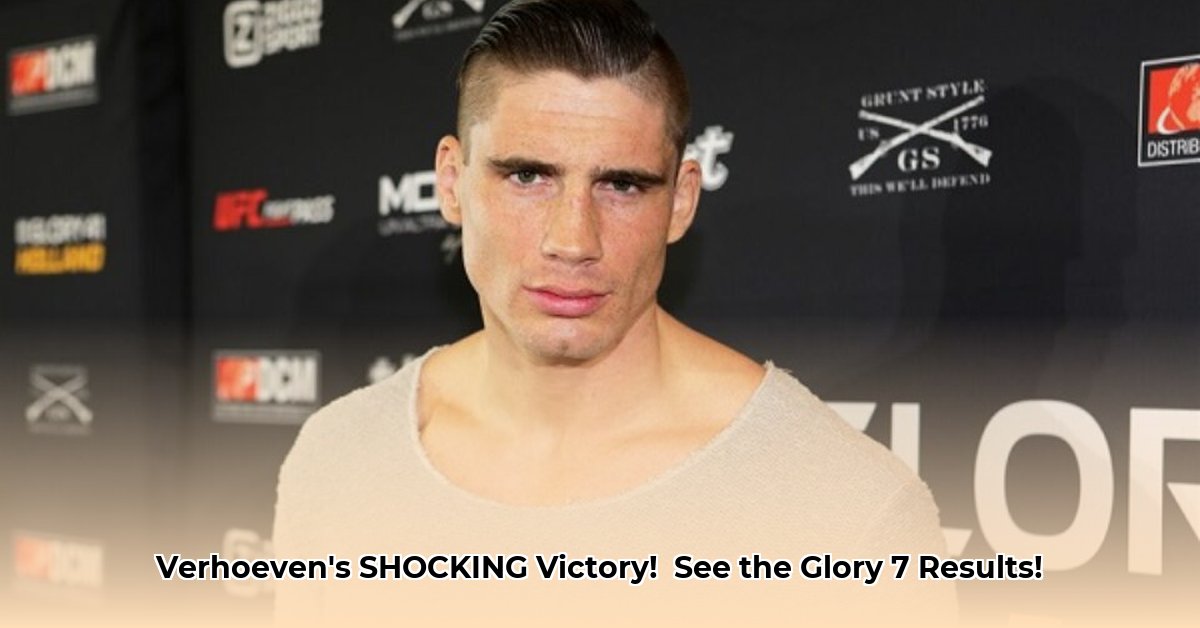
Rico Verhoeven's Glory Collision 7 Victory: A Strategic Triumph, or a Case of Unfulfilled Expectations?
Rico Verhoeven, the undisputed “King of Kickboxing,” successfully defended his heavyweight title at Glory Collision 7, securing a unanimous decision victory. However, while the judges' scorecards declared a clear win, the post-fight atmosphere was far from celebratory. A palpable sense of unconvinced murmurs and even audible boos rippled through parts of the crowd, leaving many wondering whether the event truly lived up to its hype. Did Verhoeven deliver a masterful display of strategic brilliance, or did the fight fall short of delivering the explosive action typically associated with his name? Let's delve into the details.
Verhoeven, showcasing his renowned tactical prowess, expertly controlled the distance, frustrating his opponent and evading many powerful strikes. He dictated the fight's pace and rhythm with precision, a true testament to his experience and masterful ring generalship. But herein lies the crux of the matter: the fight lacked the explosive knockouts and dramatic finishes that have become synonymous with his career. This raises a crucial question: was this a testament to his opponent's resilience, a calculated strategic choice by Verhoeven himself, or a combination of both?
The significant height and weight difference between Verhoeven (a towering 1.96m and 122kg) and his challenger also played a significant role. This physical mismatch undoubtedly impacted the fight's flow and excitement, making it a David versus Goliath scenario from the outset. The smaller fighter faced an uphill battle, constantly trying to overcome the considerable size and reach advantage. This disparity likely contributed to the relatively subdued nature of the bout. Was this a fair fight, or did the size difference overshadow the skill on display?
Despite the mixed fan reaction, Glory Collision 7 was undeniably a commercial success. The event boasted high attendance figures and impressive viewership numbers across various platforms, showcasing its financial strength. This apparent contradiction – commercial success alongside mixed fan reaction – underscores a significant challenge within combat sports: the delicate balance between financial profitability and delivering the thrilling spectacle that keeps fans engaged.
So, what does the future hold for the reigning champion? Verhoeven now finds himself at a pivotal career juncture. Will he continue with his current controlled, strategic style, guaranteeing wins but potentially sacrificing some of the excitement? Or will he opt for a more aggressive approach, aiming for more spectacular finishes, even if it increases the risk of a potential upset? The possibility of a move up in weight class also presents an intriguing option, one that could introduce new and thrilling challenges. These decisions are bound to shape his next steps, and the direction of his reign.
Key Takeaways:
- Verhoeven's strategic dominance secured a unanimous decision victory, solidifying his position as champion.
- The fight lacked the explosive finish many expected, leading to mixed fan reactions.
- The size difference between fighters impacted the fight's dynamic and excitement level.
- Glory Collision 7 was a commercial success despite the less-than-thrilling main event.
Analyzing the Stakeholders' Perspectives and Future Strategies
The outcome of Glory Collision 7, while a victory for Verhoeven, serves as a valuable lesson: a win isn't always synonymous with complete success. Even for a global superstar like Verhoeven, delivering a captivating, fan-pleasing experience is paramount for long-term success. The future chapter is yet to be written. How will Verhoeven and GLORY navigate the challenges ahead?
Here's a breakdown of the crucial considerations for key stakeholders:
Rico Verhoeven: Needs to consider a refinement of his fighting style, balancing control with increased aggression. He should also seek out challenging opponents who can push him to his limits.
Glory Kickboxing: Needs to analyze fan feedback and adapt future event strategies accordingly. They need to invest strategically in new talent and improve their matchmaking process.
Sponsors: Should carefully assess their return on investment (ROI), evaluating engagement and viewership numbers to optimize future sponsorship deals. Broadening their sponsorship reach beyond conventional models is also vital.
Fans: Need to manage expectations regarding fight outcomes, voicing their preferences actively to drive positive changes. Clearly expressing demands for more exciting matches is crucial.
The narrative of Glory Collision 7 highlights a fascinating ongoing debate in combat sports. How do you balance the need for commercially successful events with the demand for thrilling, fan-pleasing fights? The future of kickboxing, and Verhoeven's reign, will depend on the answers to these questions.